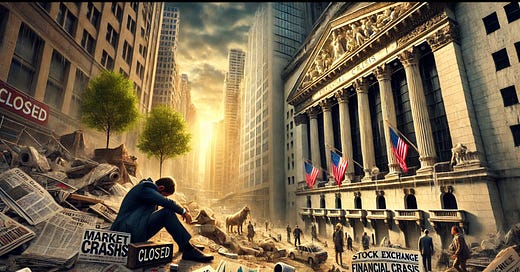The coming financial crisis?
In this slightly crazy world of thunderous announcements and equally spectacular counter-announcements, of humiliation and contempt for Europe, one could have imagined a kind of whirlwind of financial markets. This is not the case.
Markets sometimes fluctuate sharply, but they do not break. The Nasdaq's decline of more than 9% on March 7 from its February 18 high is not a breathtaking situation requiring action under pressure.
On the interest rate side, the 10-year US bond fluctuates around a horizontal trend of just over 4%.
This framework is certainly changing. The post-election enthusiasm is fading, particularly in tech stocks. The Nasdaq lost 4% at the close on Monday evening. And then President Trump is not ruling out the possibility of a recession, which seems to be a prerequisite before the return of great America. For investors, a recession is never neutral. It necessarily creates adjustments and trade-offs that may need to be anticipated now.
The recent nervousness of the markets has also been observed in Europe. The rate of the German 10-year jumped when the probable new German chancellor announced the 500 billion plan. The financing needs of the German government will jump and investors in Europe are becoming more cautious.
We have also seen the European 2-year rate recover since the ECB meeting on March 6. Expectations of a premature end to the ECB's rate cuts are therefore growing.
All this generates very marked volatility in financial indicators. We have the impression that market dynamics are regaining a form of coherence with the uncertainty surrounding economic policy and future political choices.
But is a financial crisis likely?
This is a major question and a possible answer to the world's disorders.
The world has lived conditionally on the dollar and US assets for almost 80 years. And this has been a factor of stability for the global economy.
If, under Trump's leadership, the measures taken further accentuate American isolationism, can the greenback still be at the center of the game? Certainly not.
Because the financing system of the major regions of the world will have to be more autonomous. This covers the European discussion on the "Saving and Investment Union" which broadens the concept of the Capital Markets Union.
The Europeans and the Chinese and all the others will have to find one or more alternatives to American assets consistent with the isolationism desired in the USA.
Such a transition, based on both the uncertainty of the world that is emerging and the certainty that the old world will not return, sees its probability increase. The speed and brutality of the rupture is to be found in the Oval Office with the unpredictable decisions that are taken there.
Philippe Waechter is the Chief economist of Ostrum AM in Paris



